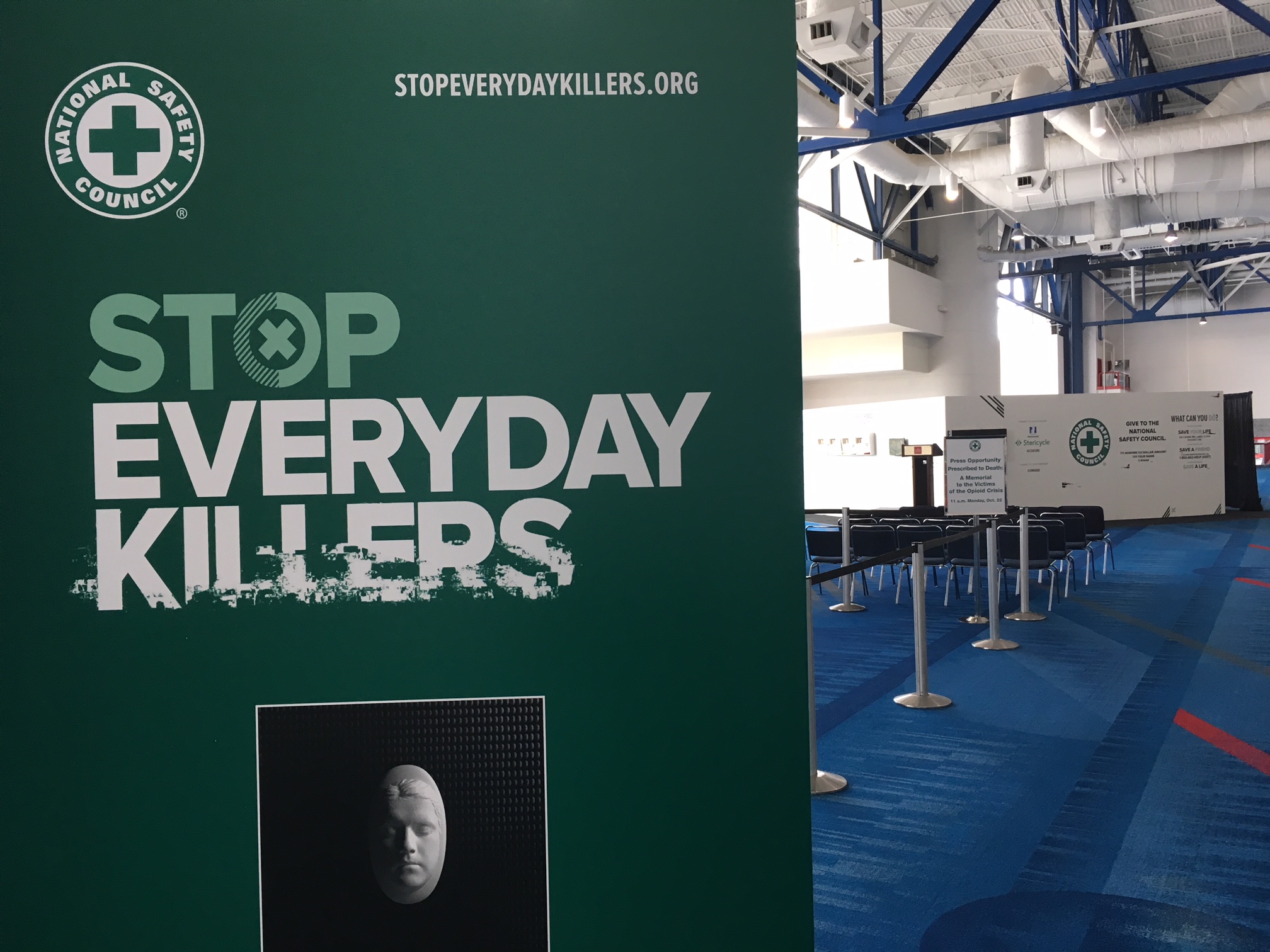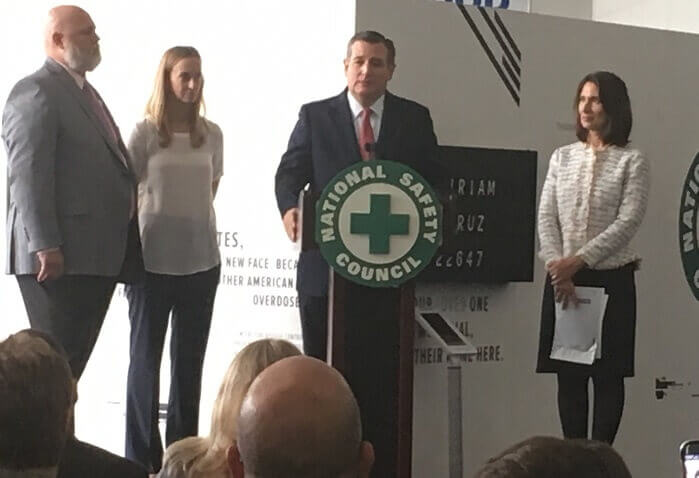Good morning everyone, and welcome. Thank you for being here, on the first day of the world’s largest annual safety conference.
We are grateful to Senator Cruz for joining us as we unveil the Prescribed to Death memorial in Houston – our seventh stop on a nationwide tour. Senator, thank you for your dedication to this important issue.
We also want to thank Nationwide Insurance and Accenture for generously sponsoring this stop, and to Stericycle, who has been by our side since we opened the memorial last November in Chicago. We could not be here today without Schneider National, who shipped the memorial from Fayetteville, Arkansas, where we visited the University of Arkansas’s campus earlier this month.

We have been honored to bring this provocative exhibit to Atlanta, Washington, D.C., Buffalo, Fayetteville and Pittsburgh, where we also reached college students by displaying it on the University of Pittsburgh’s campus. But young people are not the only ones impacted by the worst drug crisis in recorded U.S. history. Employers are on the front lines, but many still do not realize it.
The National Safety Council has a century-long history of working with individuals, organizations, business leaders and federal agencies in our mission to eliminate preventable deaths. Today, we have 15,000 member companies keeping people safe where-ever they are. Many of our members are here at our Congress & Expo.
The business community has a well-documented tradition of going beyond policies and regulations to raise the bar on safety excellence. They look at the environment their employees face every day and weigh new risks, and they are on the leading edge of emerging trends.
Before there was OSHA or any federal worker protections, business leaders realized they could do a better job of keeping people safe at work. They helped found the National Safety Council, and they always have been our greatest allies in the fight to end preventable deaths.
Today, once again, we are facing an everyday killer together – one many employers never expected, and one that can no longer be ignored.
More than 75% of those who struggle with substance use disorders are in the American workforce.
An NSC survey conducted last year found 7 in 10 employers have been directly impacted by prescription drug misuse among employees. The effects include absenteeism, substance misuse at work, and even arrests and overdose.
This memorial portrays the 22,000 people lost to prescription drug overdose in 2015, but the reality is that since 2015 – opioid-related deaths reached almost 50,000 last year.
In 2016 alone, Texas lost 1,259 people to opioid overdoses.
The most important part of this epidemic is not the statistics, but the faces on the wall. The data speak to our minds but the individual stories speak to our hearts.
In a few minutes, you will hear from Rex Butler, who lost his brother, Bill, to opioid overdose. Bill was taking opioids as prescribed by his doctor to treat a work-related injury. One of the faces on this wall bears Bill’s name.
The memorial not only brings visitors face-to-face with this everyday killer, but also encourages actions that will help us save lives.
Employers might feel helpless to address this issue, but there are so many things they can do to help employees.
First: Encourage employees to talk to their healthcare providers about the risks of opioids.
Despite all the news coverage, we’ve found one third of opioid users who are prescribed them don’t realize their medication is an opioid drug.
We created free ‘Warn Me’ labels so the public and practitioners can have a conversation about the risks and alternatives to opioids. We give ‘Warn Me’ labels to employers at no cost, because we hope they will distribute them to their employees. They are available on site at the memorial, or in bulk at NSC.org/TakeAction.
I want to thank our NSC Board of Directors who have taken the ‘Warn Me’ labels back to their employees and helped us start this important movement.
The second thing we want everyone to do is: Clean out your medicine cabinets.
We know 64 percent of users don’t get their pills from a valid prescription. Many obtain them from friends or family, so removing pills from circulation is crucial.
We partnered with Stericycle to provide Seal & Send envelopes for safe disposal of unused medications.
I have three teenage boys. I used the Stericycle Seal & Send envelope to get unused medications out of my home and we encourage everyone to do the same.
National Prescription Take Back Day is Oct. 27! Do your part.
Both the envelopes are also available for free at NSC.org/TakeAction
The third thing we want employers to do is implement employee policies around prescription drug use by expanding their EAP programs to help employees gain easier access to treatment.
70% of employers we surveyed said they would like to help employees who are struggling with prescription drug misuse return to their positions after successfully completing treatment. And we know that employer-initiated treatment is MORE effective than treatment initiated by friends or family.
NSC has created several resources for employers, including a free Employer Tool Kit and the Substance Use Cost Calculator. NSC experts will be on hand at the memorial tomorrow (TUESDAY) to offer employers suggestions, tips and additional information. We encourage Congress attendees to take advantage of their expertise.
If you are moved by what you see today, spread the word. Tell your friends and family to visit this week, because this memorial is open to the public until 5 p.m. through Wednesday. Put a ‘Warn Me’ label on your insurance card. Clean out your medicine cabinet. Implement policies and help employees get treatment if they need it.
Together we can make an impact right here in Houston, to ensure others don’t end up on this wall.

Opioid overdose has touched Sen. Cruz’s family directly. Yet, he has turned tragedy into action, supporting federal legislation that includes researching non-addictive alternatives, funding efforts to treat infants born with opioid dependencies and expanding access to treatment centers.
We are grateful for his efforts and moved by his willingness to share his personal story.
Please welcome, Senator Ted Cruz.

